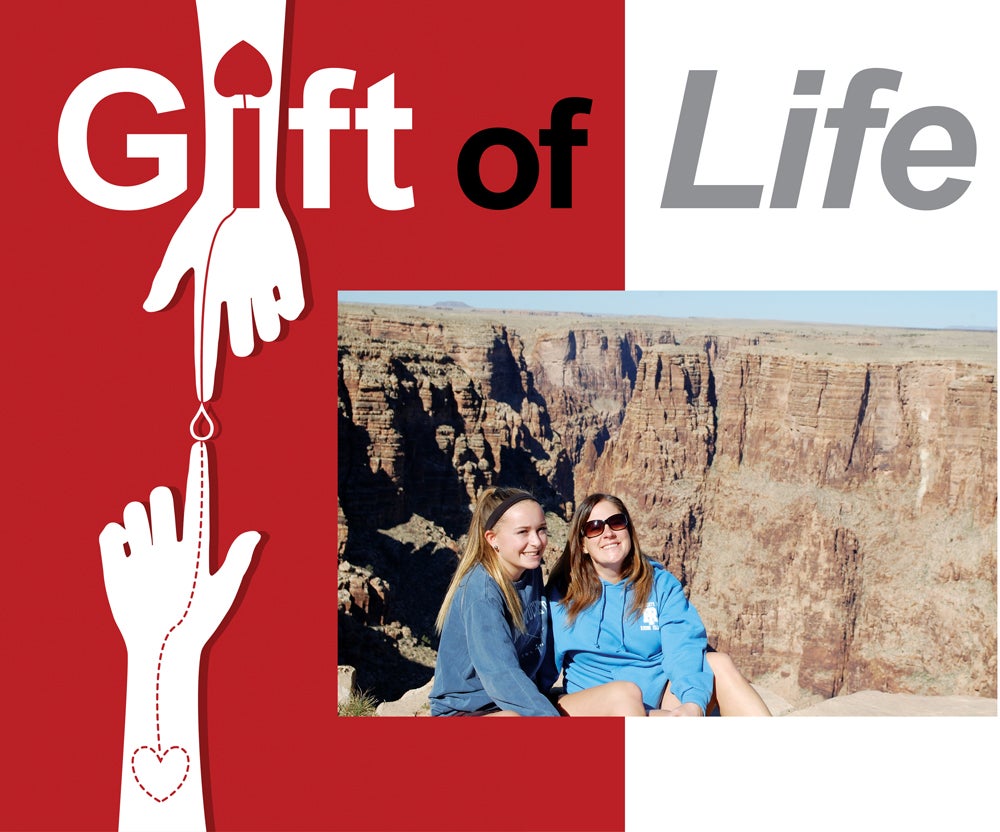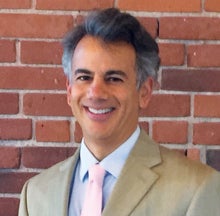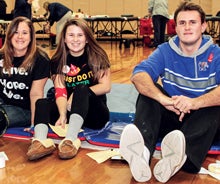
By Ellen Liberman
Donna Sweet ’96 relaxes on the portable exam table, as phlebotomist Yendi Polanco swabs an iodine patch on her right arm. On this sunny Friday morning, the North Kingstown High School gymnasium is transformed into a Rhode Island Blood Center donation facility. As soon as the doors open at 7:30 a.m., a steady stream of students and faculty begin moving through the stations for check-in, giving blood, and recovery.
“Okay, a quick pinch,” Polanco apprises her, “and then gentle squeezes from here on out.”
After 52 donations, Sweet knows the drill—the whole school does. Eleven years ago, North Kingstown High School was lucky to break 40 pints in a blood drive. But in 2005, a family trauma changed Donna Sweet, and two years later, Donna Sweet changed the school.
Sweet had just applied to join the faculty as a guidance counselor when she brought her oldest daughter Sarah to Hasbro Children’s Hospital for a suspected bladder infection. The Sweets left with a diagnosis of cancer. The 4-year-old girl had a ganglioneuroblastoma on her abdomen, a rare type of early childhood tumor with benign and malignant cells. Sarah would need surgery and numerous blood transfusions.
Her family managed with the help of Hasbro’s Tomorrow Fund, which eases the emotional and financial stress on families coping with a pediatric cancer, and Sarah made a full recovery. Two years later, the Rhode Island Blood Center, which had learned about the Sweets’ ordeal through the Tomorrow Fund, tapped Donna Sweet to tell her story at the high school’s annual blood drive assembly.
“It was a little nerve-wracking,” recalls Sweet, now an assistant principal. “But I told them about the importance of blood donations. One simple act—a pint of blood—can save three lives.”
The greater URI community has been a key factor in that equation. The Rhode Island Blood Center needs to collect 200 units a day to keep a sufficient supply, and every day that goal is challenged by unexpected demands, like the Orlando nightclub shooting, and threats to the supply, like the emergence of the Zika virus. Overall donations have dropped, but since 1979, the University of Rhode Island community has increased its share of giving. To date, it has donated 55,122 units of blood in drives sponsored annually by individual colleges and campus organizations. Last September, for example, URI’s Greek Life attracted 350 students, faculty and staff to a drive in the Memorial Union. With the fraternities and sororities working together, it was the most successful blood drive in five years, says senior Alexia Williams, the Panhellenic Executive Council’s vice president of philanthropy and service.
“That was very exciting—to help people overcome their fears about donating, rather than feeling pressure to do something,” says Williams, who conquered her own reluctance, and began donating last year. “It felt very empowering and I’ve been a faithful donor ever since.”
But URI’s connections to the Rhode Island Blood Center go deeper. Vice President and Chief Operating Officer Scott Asadorian ’89, M.B.A. ’91, has put his two business degrees to work helping steer the Blood Center to stability. It is now the only full-service testing laboratory in New England, not only screening donated blood, but performing highly specialized blood tests for hospitals. The Blood Center also provides patient care such as stem cell collection and platelet removal.
“This is a community asset, and we’re trying to be as cost effective as we can while still delivering world-class products and services. When you think about it, there’s not a lot of difference between a for-profit and a nonprofit. We use all the same analytics and tools that any business would use,” Asadorian says. “And it’s always great to hire URI alums—to give an opportunity locally to those who want to stay in Rhode Island.”
Donor Resources Account Manager Sarah Perez ’04 is a good example. Perez, a Talent Development program alum, was sure she was going to turn her marketing degree into a full-time job at the Walt Disney Company. But she learned of an opening in the Blood Center’s marketing department through a friend, found her niche, and has thrived.
“I am able to be creative and have fun with the job,” Perez says. “I get to do public speaking, plan fun events and save lives while doing it. I have flexibility and there are so many different facets to the job. It’s not the same old, same old every day.”
One thing doesn’t change: the need to cultivate repeat donors. More than a third of Rhode Islanders are eligible to donate blood, but only 5 percent give. The center works especially hard to teach young adults about the importance of participating in blood drives, because donations from high schools and colleges make up 15 percent of the supply.
“The University has been amazing to work with. Without the support of URI, it would definitely be more difficult to ensure that the need is met,” says the center’s Director of Donor Resources Nicole Pineault ’03. More importantly, she says, “high schools and universities give us the opportunity to create lifelong donors. Every year, there are people who can no longer give. That’s why we constantly have to be replacing our regular donors.”


Sweet’s personal story turned North Kingstown High School into one of the state’s most prolific community of givers. Donations jumped from 40 units in 2007 to 108 in 2008. In 2012, the school doubled its drives from two to four each year. Since 2008, the school has provided 2,206 units to the Blood Center.
Back at the school’s gym that Friday, every slot is booked. In less than 15 minutes, one pint of Donna Sweet’s lifesaving blood is in the bag. Two tables over, North Kingstown High School senior Rachel Bedard is donating for the first time. The school is one of the state’s largest feeder schools to URI, and Bedard, a senior, has applied. She may well enter that circle of giving that runs from the high school to the University to the Blood Center. But, for now, she’s in the moment, and glad of it: “I did something good today,” she says. •
 Home
Home Browse
Browse Close
Close Events
Events Maps
Maps Email
Email Brightspace
Brightspace eCampus
eCampus


